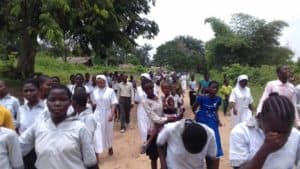In Democratic Republic of Congo, Catholic laity rally the nation for political change
SINCE THE END of last year, when the Catholic laity in the Democratic Republic of Congo (DRC) began to openly organize protests against their country’s political stalemate, there has been support from many quarters, both inside and outside the country. The local bishops are supporting their people too. Just recently, Pope Francis spoke up for the common good of all the Congolese people. Ecumenical and inter-faith relations are getting stronger, even as the government cracks down on protests.

And a new climate of support is also emerging among other Christians and those of other faiths, despite new victims of state violence. On Feb. 25, 2018, in the capital Kinshasa and other cities, peaceful protest marches organized by Catholic lay people were once again repressed.
So far, according to Church figures, there have been 149 peaceful marches, of which 66 were suppressed while still within parish grounds; 67 were broken up with live bullets and tear gas; and just 16 took place without incident. The final toll was two people shot dead, 32 wounded (13 of them with bullet wounds) and 76 people arrested. The police however claimed that just one person has been killed, by a rubber bullet, and that only five people have been wounded.
At the heart of the protests is a rejection of violence in every form and a condemnation of the self-perpetuating dictatorship of the regime; protesters also have called for free and transparent elections. At issue is the refusal of President Joseph Kabila to step down in accord with the constitutional term limit, something he had first agreed to as part of an agreement brokered in late 2016 by the DRC bishops’ conference. Mr. Kabila’s refusal to allow for presidential elections has triggered violence across the country.
The Church’s lay coordinating committee—which has been the moving force behind the protest marches—drew its inspiration from the message of the Congolese bishops at their Extraordinary Assembly held last November, at which the prelates declared: “Stand firm, people of the Congo; the country is in trouble.” The committee’s aim is to overcome the crisis of confidence in politicians, who have long been accused of inaction and corruption.
The call by Pope Francis for a Day of Prayer for Peace on Feb. 23, 2018, specifically for South Sudan and DRC—on the grounds peace is essential to development—was warmly welcomed in the local press as “an initiative coming from a great moral figure.” Messages of support for the protesters have also come from the bishops’ conferences of Niger, Burkina Faso and Madagascar; plus, there has been a flurry of visits by presidents of various countries of central and southern Africa.
Though they did not participate in any of the protest marches initially, recently members of Evangelical and other Protestant communities have joined the Catholic protesters, while Muslims have also begun expressing support; they have also condemned the violent crackdown on marchers by authorities. The various faith communities and religious groups have drawn closer together recently, realizing that they face the same realities in their towns and suburbs. The high cost of living, inflation and the shortage of basic essentials are hardships that affect everybody, regardless of religious faith or political allegiance.
—Dionzo Nsele Aimé Cyprien & Karla Sponar

